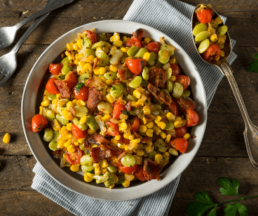This Popular Beverage Is Linked to Earlier Death
Yet another study has linked drinking soda to negative health effects. The European study, which researched the health of participants for an average of 16 years, found that drinking more than two sodas per day is linked to a risk of earlier death.
The researchers explained that the sugar in soda—regardless of whether the soda is diet or regular—can lead to obesity and can affect how your body uses insulin. Both of these conditions can shorten your life. In addition to this study’s findings, soda consumption has also been linked to an increased risk for cancer and heart disease.
To protect your health, try opting for water as your beverage choice whenever possible. For more information about the health risks of soda, please consult your doctor.

Get your Fill of Flavonoids
It’s easier than you might think to consume 500mg of flavonoids.
Here are three simple ways to get your daily dose:
- Drink 1 cup of green tea.
- Eat 100 g of blueberries.
- Eat 100 g of broccoli.

Nutritional Information (per serving)
| Total Calories | 203 |
| Total Fat | 8 g |
| Protein | 7 g |
| Carbohydrates | 30 g |
| Dietary Fiber | 7 g |
| Saturated Fat | 1 g |
| Sodium | 43 mg |
| Total Sugars | 6 g |
Source: USDA
Autumn Vegetable Succotash
Ingredients
- ¼ cup olive oil
- 1 cup onion (diced)
- 2 garlic cloves (finely chopped)
- 2 cups red bell pepper (chopped)
- 2 cups zucchini (diced)
- 2 cups yellow summer squash (diced)
- 3 cups lima beans (frozen)
- 3 cups corn (frozen)
- 2 tsp. dried sage
Preparations
- In a skillet over medium-high heat, add oil.
- Add onion and cook until translucent.
- Add garlic, bell peppers, zucchini, squash, lima beans and corn. Season as desired.
- Cook, stirring, until vegetables are tender (about 10 minutes). Stir in sage and serve.
Makes: 8 servings
For more information and helpful links, please download our November 2019 Live Well, Work Well Newsletter.
This article is intended for informational purposes only and is not intended to be exhaustive, nor should any discussion or opinions be construed as professional advice. Readers should contact a health professional for appropriate advice.

